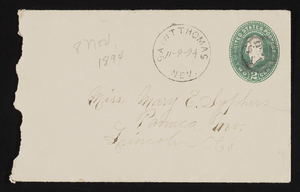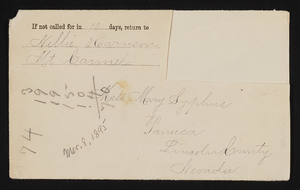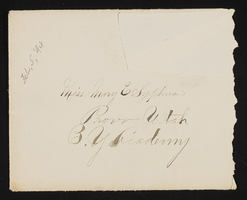Search the Special Collections and Archives Portal
Search Results

Letter and envelope from John M. Bunker, St. Thomas, Nevada to Mary Etta Syphus, Panaca, Nevada
Date
Archival Collection
Description
From the Syphus-Bunker Papers (MS-00169). The folder contains an original handwritten letter, an envelope, a typed transcription of the same letter, and a copy of original letter attached.
Text

Letter and envelope from Nellie Harrison, Mt. Carmel to Mary Etta Syphus, Panaca, Nevada
Date
Archival Collection
Description
From the Syphus-Bunker Papers (MS-00169). The folder contains an original handwritten letter, a typed transcription of the same letter, the original envelope with the stamp removed, and a copy of the original letter.
Text

Letter and envelope from John M. Bunker, Logan, Utah. to Mary Etta Syphus, Provo, Utah
Date
Archival Collection
Description
From the Syphus-Bunker Papers (MS-00169). The folder contains an original handwritten letter, a typed transcription of the same letter, the original envelope with the stamp removed, and a copy of the original letter.
Text

Nery Martinez interview, December 6, 2018: transcript
Date
Description
Interviewed by Laurents Bañuelos-Benitez. Nery Martinez was born in El Salvador, he describes his childhood as one filled with war and violence. When Martinez was five years old, the small country of El Salvador erupted in civil war. Martinez describes the panic that he saw growing up, never being certain when violence could occurred. The 12 year war took up the entirety of Martinez's childhood. After the war, the country was left in runes, seeing little hope for recovery, Martinez left El Salvador for Las Vegas where his brothers had fled earlier during the war. In Las Vegas, Martinez was able to find work in the service industry, at the same time attending English classes at night. Martinez is currently working as a bartender within the Culinary Union. Interview conducted in Spanish.
Text
Margaret and Frank Price oral history interview
Identifier
Abstract
Oral history interview with Margaret and Frank Price conducted by Joanne L. Goodwin on March 05, 1997 for the Women's Research Institute of Nevada (WRIN) Las Vegas Women Oral History Project. Margaret Price opens the interview by describing the family's move from Ohio to Las Vegas, Nevada for Frank's health in 1950. Price then moves on to describe her experiences and the people she met while working as a waitress at the El Rancho Hotel and Casino. Margaret and Frank Price then discuss Margaret's career at the Dunes, and the variety of entertainment acts available in the 1950s. The Prices also describe job stability, worker benefits, and unions during the 1950s. Frank then discusses organized crime in Las Vegas and its relation to law enforcement and sex work. He also talks about the various casinos he worked at and the effects that the shift from individual owners to corporate ownership had on the casino industry. The interview ends with both Prices sharing their memories and knowledge of Binion's Hotel and Casino.
Archival Collection
Legal files, 1959-1990
Level of Description
Scope and Contents
The legal files series contains documents pertaining to litigation regarding various J.A. Tiberti Construction projects between 1959 and 1990.
Archival Collection
Collection Name: J. A. Tiberti Construction Records
Box/Folder: N/A
Archival Component

Meeting minutes for Consolidated Student Senate, University of Nevada, Las Vegas, October 3, 1978
Date
Archival Collection
Description
Text
Hazel Hedges oral history interview
Identifier
Abstract
Oral history interview with Hazel Hedges conducted by Irene Rostine on October 29, 1997 for the Women's Research Institute of Nevada (WRIN) Las Vegas Women Oral History Project. Hedges opens her interview by discussing her move to Las Vegas, Nevada from Kansas in 1952. She discusses what it was like to move across the country at that time and her search for employment. Hedges describes her work as a waitress at the Thunderbird Hotel and her true interest, real estate. Hedges talks about her real estate career which began in 1960, how that job allowed her to see Las Vegas grow, and her success in the industry. Lastly, Hedges discusses organizations at the time that assisted in the training of women realtors and her own community work.
Archival Collection

Transcript of interview with Nancy Horden by Ward Murashige, February 26, 1980
Date
Archival Collection
Description
On February 26, 1980, collector Ward Murashige interviewed Nancy Horden (born February 7th, 1921 in Las Vegas, Nevada) in James Dickenson Library at the University of Nevada, Las Vegas. The interview covers Nancy’s family background, and life in Nevada, including home life, recreation, and hobbies. During this interview, Nancy also discusses local development, and the social and environmental changes that have occurred over the span of her lifetime in Las Vegas, Nevada.
Text

Transcript of interview with Sharon Gutzman by Lisa Mades, March 13, 1981
Date
Archival Collection
Description
On March 13, 1981, Lisa Mades interviewed Sharon Gutzman (born in Winnipeg, Canada in 1935). Gutzman talks much about early Las Vegas, Nevada, including early businesses, the first casinos, and the first airport. She also discusses educations, shopping, recreation, entertainment, and gambling.
Text
